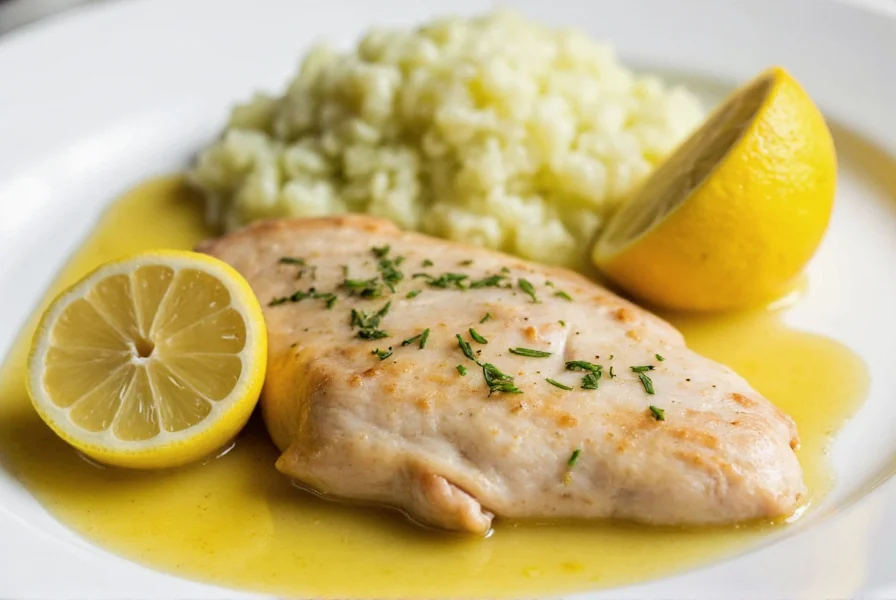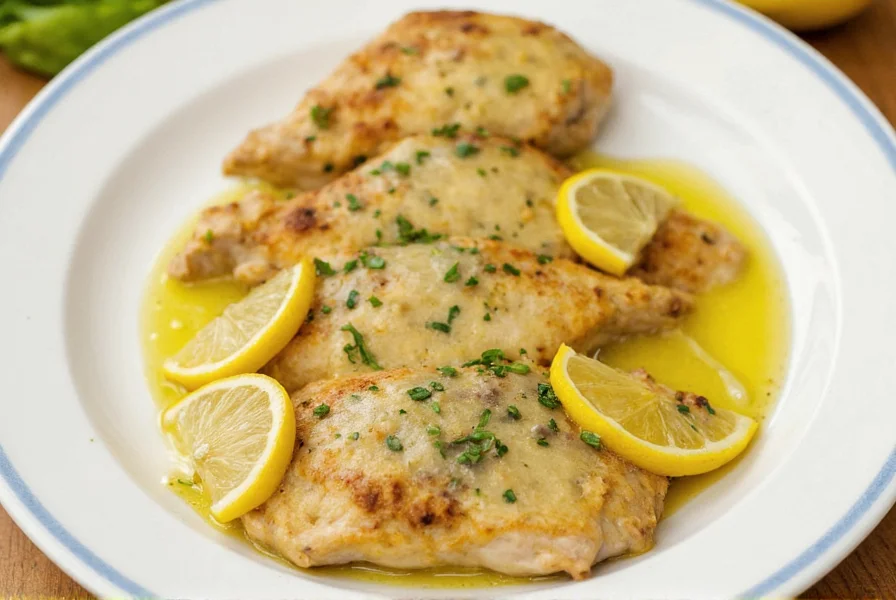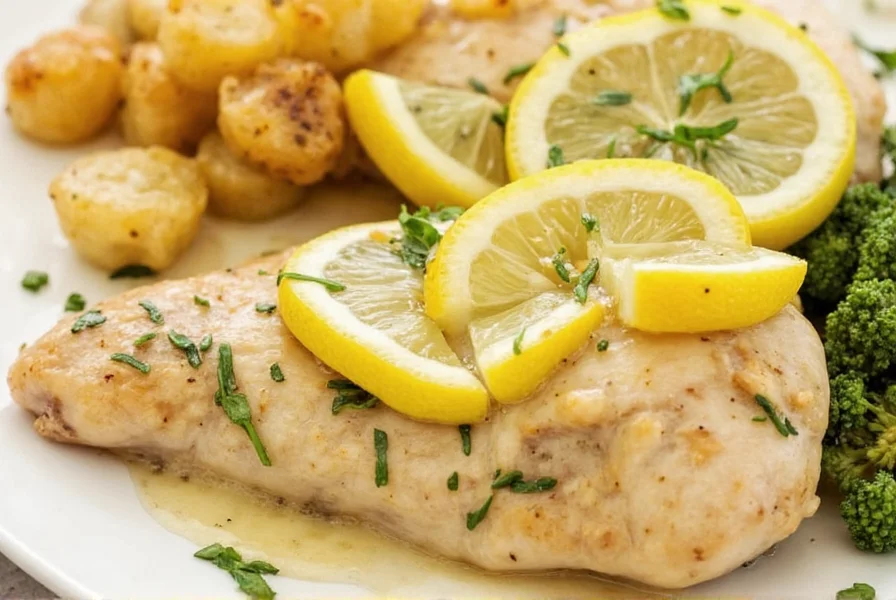The perfect lemon herb sauce for chicken combines fresh lemon juice, garlic, olive oil, and aromatic herbs like parsley, thyme, and dill. This versatile sauce enhances grilled, baked, or roasted chicken with bright citrus notes and herbal complexity. Our tested recipe uses 1/4 cup fresh lemon juice, 2 minced garlic cloves, 1/2 cup extra virgin olive oil, 2 tablespoons each of chopped fresh parsley and dill, 1 tablespoon fresh thyme, salt, and pepper. Whisk ingredients together and let sit for 15 minutes before using. This simple preparation yields a balanced sauce that complements chicken without overpowering its natural flavor.
Creating the ideal lemon herb sauce for chicken requires understanding how citrus and herbs interact with poultry. This classic combination has been perfected across Mediterranean cuisines for good reason—lemon cuts through chicken's richness while herbs add aromatic complexity. Unlike store-bought versions that often contain preservatives and artificial flavors, homemade lemon herb sauce lets you control ingredients and freshness.
Why Lemon Herb Sauce Works Perfectly with Chicken
Lemon's acidity tenderizes chicken while enhancing its natural flavor profile. When combined with complementary herbs, the sauce creates a flavor bridge between the poultry's mild taste and more robust seasonings. The acid in lemon juice helps break down proteins slightly, allowing the sauce to penetrate the chicken surface for deeper flavor absorption—especially important for lean cuts like chicken breasts that can become dry.
Essential Ingredients Breakdown
Understanding each component's role ensures your easy lemon herb sauce recipe for grilled chicken delivers consistent results:
| Ingredient | Function | Substitution Options |
|---|---|---|
| Fresh lemon juice | Provides bright acidity and tenderizing properties | Bottled lemon juice (less vibrant flavor) |
| Extra virgin olive oil | Carries flavors and creates emulsion | Avocado oil (milder flavor) |
| Fresh parsley | Grassy, fresh herbal note | Cilantro (different flavor profile) |
| Fresh dill | Delicate anise-like flavor that complements chicken | Tarragon (similar flavor profile) |
| Fresh thyme | Earthy depth and complexity | Rosemary (use sparingly, stronger flavor) |
Step-by-Step Preparation Guide
Follow these steps for the best herbs for lemon sauce with chicken that maintains perfect texture and flavor balance:
- Zest one lemon before juicing to add aromatic oils without excess acidity
- Whisk together 1/4 cup fresh lemon juice, 2 minced garlic cloves, and 1 teaspoon lemon zest
- Slowly drizzle in 1/2 cup extra virgin olive oil while whisking continuously to create emulsion
- Add 2 tablespoons each chopped fresh parsley and dill, plus 1 tablespoon fresh thyme leaves
- Season with 1/2 teaspoon salt and 1/4 teaspoon black pepper
- Let sauce rest for 15 minutes before using to allow flavors to meld
Variations for Different Cooking Methods
The healthy lemon herb sauce for baked chicken can be adapted for various cooking techniques:
- For grilled chicken: Add 1 tablespoon Dijon mustard to help the sauce cling to the chicken during high-heat cooking
- For roasted chicken: Incorporate 2 tablespoons chicken broth for a richer pan sauce
- For creamy version: Blend in 2 tablespoons Greek yogurt for a creamy lemon herb sauce for chicken that's still light
- For dairy-free option: Use avocado instead of yogurt for creaminess without dairy
Application Techniques for Maximum Flavor
How you apply your lemon herb sauce for chicken thighs recipe significantly impacts results:
- Marinating: For boneless cuts, marinate 30-60 minutes (longer can make texture mushy due to lemon's acidity)
- Basting: Apply during last 5-10 minutes of cooking to prevent burning of herbs
- Finishing sauce: Drizzle over cooked chicken just before serving for brightest flavor
- Side sauce: Serve extra on the side for dipping, especially with grilled preparations

Common Mistakes to Avoid
Even experienced cooks make these errors with light lemon herb sauce for roasted chicken:
- Using bottled lemon juice exclusively (lacks fresh brightness and contains preservatives)
- Adding herbs too early in cooking (causes flavor degradation and color loss)
- Over-marinating in acidic components (makes chicken texture unpleasant)
- Using dried herbs instead of fresh (dried herbs work better in long-cooked dishes, not fresh sauces)
- Not balancing acid with fat (results in harsh, one-dimensional flavor)
Storage and Reheating Guidelines
Proper storage maintains your authentic Mediterranean lemon herb chicken sauce quality:
- Refrigerate in airtight container for up to 5 days
- Freeze in ice cube trays then transfer to freezer bags for up to 3 months
- When reheating, gently warm without boiling to preserve fresh herb flavors
- Stir in a teaspoon of water if sauce separates during storage

Perfect Pairings for Your Lemon Herb Chicken
This versatile sauce complements numerous side dishes:
- Roasted asparagus or green beans
- Quinoa or couscous salad with cherry tomatoes
- Garlic mashed potatoes
- Fresh arugula salad with shaved Parmesan
- Crusty bread for soaking up extra sauce
FAQs About Lemon Herb Sauce for Chicken
Can I make lemon herb sauce without fresh herbs?
While fresh herbs deliver the best flavor for lemon herb sauce for chicken, you can substitute dried herbs in a pinch. Use one-third the amount of dried herbs (for example, 1 teaspoon dried instead of 1 tablespoon fresh). Add dried herbs earlier in the process to allow time for rehydration, and consider adding a pinch of sugar to balance flavors since dried herbs lack some natural sweetness.
How long should I marinate chicken in lemon herb sauce?
For boneless chicken breasts or thighs, marinate in lemon herb sauce for 30-60 minutes maximum. The acid in lemon juice begins to break down proteins, and extended marinating (beyond 2 hours) can make the chicken texture mushy. Bone-in pieces can handle slightly longer marinating—up to 2 hours—without texture issues.
Why does my lemon herb sauce separate?
Lemon herb sauce separation occurs when the emulsion breaks, typically from adding oil too quickly or temperature differences between ingredients. To fix separation, start with a fresh bowl and slowly whisk in 1-2 teaspoons of lemon juice or water while gradually adding the separated sauce back in. For prevention, ensure all ingredients are at room temperature and add oil in a very slow, steady stream while continuously whisking.
Can I use this sauce for other proteins besides chicken?
Absolutely—this versatile lemon herb sauce works beautifully with fish (especially salmon and white fish), pork tenderloin, and even roasted vegetables. For seafood, reduce the garlic to 1 clove and add a pinch of red pepper flakes. The sauce's bright acidity complements most proteins, though cooking times may need adjustment based on the ingredient's delicacy.











 浙公网安备
33010002000092号
浙公网安备
33010002000092号 浙B2-20120091-4
浙B2-20120091-4